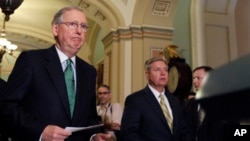Senior U.S. senators wary of ongoing nuclear negotiations with Iran warned Sunday that President Barack Obama could face stiff congressional opposition to any final deal between Western powers and Tehran.
U.S. Secretary of State John Kerry has been leading a U.S. delegation at the Vienna talks, and officials say "major issues" remained as late as Sunday, including differences over a United Nations arms embargo on Tehran that Western powers want to maintain.
In Washington, Senate Majority Leader Mitch McConnell, speaking on Fox News Sunday, criticized the deal, saying it will leave Tehran as "a threshold nuclear state." McConnell and other critics say the Obama administration has conceded too much to Iran in its push to curb its nuclear weapons potential.
"There was another option here I would like to remind people." McConnell said. "Rather than spending multiple years trying to get one of the worst regimes in the world to agree to limit their nuclear capabilities, we could ratchet up sanctions even further, because that's what brought them to [the talks] in the first place."
Separately Sunday, Republican Senator Lindsey Graham, a 2016 presidential contender and vocal critic of the talks, voiced support for maintaining an interim agreement in place since late 2013. He told CNN the interim deal, which lifted some economic sanctions against Tehran in exchange for a short-term freeze on nuclear development, has worked better than expected.
He also emphasized his skepticism about Obama's ability to reach a stronger deal, and insisted he would use military force against Iran if he were president and Tehran violated nuclear agreements.
Democrat Bob Menendez, a key member of the Senate Foreign Relations Committee, also voiced reservations about the pending deal. He said the ongoing talks opened at the wrong starting point, when negotiators did not try to remove Tehran's existing nuclear infrastructure.





